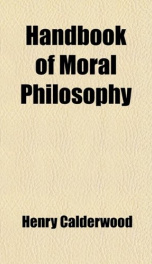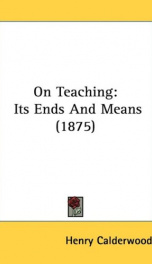handbook of moral philosophy

Purchase of this book includes free trial access to www.million-books.com where you can read more than a million books for free. This is an OCR edition with typos. Excerpt from book: CHAPTER II. MORAL JUDGMENTS. 1. Our first steps towards a philosophy of morals must be taken in searching for an answer to the questionHow do we know that certain actions are right actions ? A further question must ariseHow do we come to feel as we do on matters of right and wrong in conduct ? This question, however, must be regarded as a later inquiry, waiting answer to the other. This second question is stated now only to be avowedly deferred, thereby escaping entanglement. That it cannot be considered here is clear on this ground, that what we feel as to right and wrong implies moral distinctions, the recognition of which first needs explanation. At the outset our inquiry is concerned with Knowledge, and how it is attained; with Understanding, and the basis on which it rests ; with our Thought, and its warrant. 2. Knowledge of matters of fact is obtained in three distinct forms. These areSensation, knowledge of impressions made on our physical nature; Perception, knowledge of objects by interpretation of our experience; Judgment, a more advanced knowledge of objects, either by means of simple comparison, or by inference. The second and third are commonly united in intellectual procedure, for Judgment is essential to Perception. These distinctions in the exercise of intellectual power are here simply accepted as the product of Psychology, of the intellectual powers. As Affections and Sentiments presuppose knowledge of qualities belonging to objects observed, and as the Laws of Association merely provide for the combination of the facts of knowledge, these cannot afford any theory of the origin of our knowledge of moral distinctions. Sentimental and Asso- ciational theories of the recognition of these distinctions are thus excluded on exactly the same grou...
Info about the book
Author:
Series:
Unknown
ISBN:
1117115453
Rating:
5/5 (2)Your rating:
0/5
Languge:
English
Users who have this book
Users who want this book
What readers are saying
What do you think? Write your own comment on this book!
write a commentif you like handbook of moral philosophy try:
Do you want to read a book that interests you? It’s EASY!
Create an account and send a request for reading to other users on the Webpage of the book!



